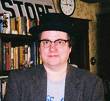
Sweet Curdle. Cathryn Cofell. (Marsh River Editions M233 Marsh Rd. Marshfield, WI. 54449)
http://marshrivereditions.com $10.
Cathryn Cofell has written a beautiful and bloody collection of poetry about being a woman, mother and lover. The poems here scream authenticity; the language is evocative, and at times arresting. In the poem “Wrappers” Cofell traces her carnal life with men through the very blood she sheds. In these passages we see a portrait of a young girl’s sexual awakening, and an old woman’s sad/sweet resignation:
“You’re twelve and in love with the boy next door,
only you don’t quite know it yet.
That tingle between your legs
is something you fumble for while your sister sleeps,
while you are awake and dreaming.
You play married, practice that first boy kiss
against your pillow, hide pennies under
your tongue to imagine his taste.
The next day you’re doing laps in the pool
and suddenly blood is everywhere.
You check the water for sharks.
You dead man’s float but no one comes
to save you. This is how you learn
you are a woman: a pool of blood,
underwear packed with toilet paper,
a grocery bag handed over without words,
filled with pads and belts, too many loose ends…
You will bleed through two weddings, one divorce
twelve intrauterine inseminations,
twenty-five pregnant friends,
half a dozen bloated tirades on the way to the movies,
the gas station, through the lipstick aisle at Sears,
a thousand reasons to reject science or God or both
until your done,
done in,
chewed up like a piece of sugarless gum,
bled out like an old brake line,
scooped out like a pumpkin,
all your insides dumped, bagged, tied with a twist,
taken to the curb,
your outside shell washed clean
and grinning.”
In “Expectant Mother” the poet compares her poetry to her life as a doting mother:
“This is my life’s work
a conductor, open and waiting. Limp
from the weight of midnight arias,
afternoon rehearsals. Manic as sheet music,
holding notes like babies. Some will grow
to become riffs, songs, symphonies.
some will not; I will be so full
of the blues I will bang
their small backs until they are still.
None will be what I imagined. At best,
an anthem whistled in gauze, a myth of spittle."
Highly recommended.
Doug Holder/ Ibbetson Update

























